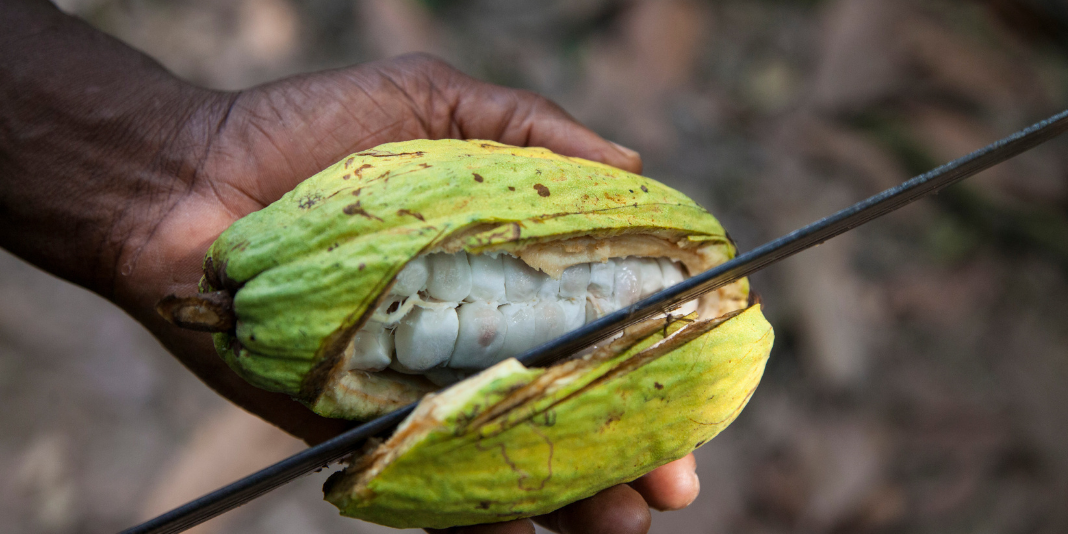COCOA FROM GHANA – GHANAIAN CHOCOLATES
Third wealth of the country, cocoa is a major contributor to Ghana’s economy (after gold and oil). The country is the second largest producer of cocoa, after Ivory Coast. Both countries produce up to 60% of the world cocoa production. But for a long time, they had never processed the cocoa beans in situ, leaving all the added value of the cocoa treatment to international companies. However, little by little, things are indeed changing: the Ghanaian state has decided recently to promote local processing to produce “Made in Ghana” chocolate for internal and external consumption.
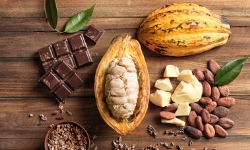
History of cocoa in Ghana
Tetteh Quarshie is associated with cocoa in Ghana as the man who has introduced cocoa beans in Ghana in 1879 after a 6-year stay in Fernando Po island (now Bioko in today’s Equatorial Guinea). Born in 1842, Tetteh Quarshie was a master blacksmith whose hobby was farming. It is said that he hid 6 pods of cocoa beans in his blacksmith’s toolbox when returning from his missionary journey in Fernando Po and planted them in Mampong Akuapem, where the climate and soil conditions were ideal for cocoa cultivation.
Ghana started to export cocoa in 1890s and became very quickly the world’s largest exporter (from 1910 to 1980). Nowadays Ghana’s cocoa is known for its highest quality and remains at the heart of the country’s economy, bringing hundreds of millions of dollars annually from the export of the beans and processed materials.
Cocoa production
According to the Ghana Cocoa Board, also known as COCOBOD, a public organization in charge of managing the cocoa sector in Ghana, the cocoa industry employs approximately 800 000 farming families, and indirectly millions of people working in trading companies or production or trade of agricultural inputs. The majority of the production is harvested by small independent farmers with less than 3 hectares whose yield is around 400kg/ha.
Renewed efforts are being made by all stakeholders of the cocoa sector to better train the farmers, share the knowledge between all the partners and invest in the sector. It results in more effective harvesting processes, higher cocoa yields and better quality.
Around 850 000 tonnes of cocoa beans are produced every year in Ghana. But the irony is that a very small part of this production is processed locally, the majority of these beans being exported to be transformed into finished products abroad.
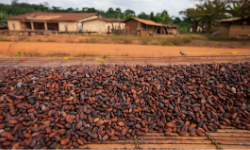
Cocoa Beans
Boosting the cocoa processing in Ghana
However, since 2017, the Ghanaian government, together with the Ivorian one, have decided to promote the local transformation of the cocoa. They intend to locally process at least 50% of the national harvest in the years to come and invite the private sector to invest massively in the cocoa processing in situ. The idea is to weigh more in the world cocoa economy and be less dependent on fluctuations on the price of cocoa beans.
However, cocoa processing is facing several problems in this part of Africa. The local demand is still weak, probably because of the high prices of finished products mostly imported from Europe. But the government’s will to develop the local market is strong. To allow local companies to produce more affordable cocoa products, the government is though implementing incentive measures to help reducing the manufacturing costs for companies transforming cocoa in Ghana (abolition of import taxes on industry equipment, moratorium on corporate tax or discount on the beans purchase price…). Today, Ghana is mostly producing semi-finished products. Local manufacturing of finished cocoa products is still at an early stage but recently, several brands have been created in the confectionery sector, such as Niche, ’57 Chocolate or Midunu…
In order to develop the local market and boost chocolate consumption among the locals, some marketing campaigns have been launched by the government and the 14th February, celebrated worldwide as Valentine’s Day, has been declared National Chocolate Day.
Here are some of the companies creating made in Ghana chocolates.
Golden Tree Chocolate

Cocoa Processing Company Limited (CPC) based in Tema was established in 1965. It was incorporated as a limited liability company in November 30, 1981 and publicly listed on the Ghana Stock Exchange on February 14, 2003.The company comprises three factories: two Cocoa Factories and a Confectionery Factory. CPC manufactures the Golden Tree de luxe Chocolate Bars. There are seven different brands namely, Kingsbite, Oranco, Akuafo, Coffee Choc, Portem Nut, Portem Pride, Tetteh Quarshie and Aspire. Currently they are produced sizes in 20g, 50g and 100g.
https://www.goldentreeghana.com/products/chocolate-bars
Niche, the industry leader
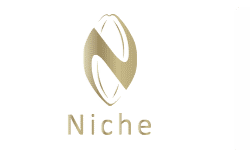
Niche Cocoa Industry Limited is the first private Ghanaian company to process cocoa locally. It was created in 2011 by a local entrepreneur and employs more than 350 people in the factory located in the east part of Accra. It mainly produces semi-finished products for export towards Europe and China, such as cocoa liquor, powder or butter but started to produce chocolate bars for the local market (extra dark, dark, milk and fruit-flavored milk tabs). The range has expanded recently, offering chocolate bites, which can be offered as a gift. The idea is to develop the range furthermore, to include cocoa powder and chocolate spreads… Niche chocolates can easily be found in some supermarkets in Accra.
DecoKraft, the Chocolate Lady
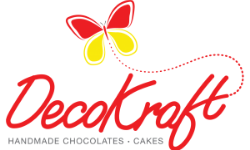
Akua Obenewaa Donkor is one of the pioneer in the handmade chocolate confectionery and pastries in Ghana. She started her company DecoKraft in 2012 after having been trained by the Cocoa Processing Company, which started to train people to become chocolatier. Known as “Lady Chocolate”, she produces exotic handmade chocolates and pastries mainly for events like weddings, engagements, birthday parties and corporate events. They can also be bought on online shops. (0243 827 724)
’57 Chocolate, artisanal chocolate made “from bean to bar”
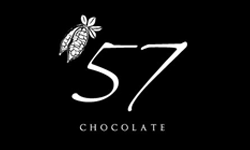
In 2014, when returning from a few years in Switzerland, a duo of Pan-African sisters, Kim and Priscilla Addison, decided to create “’57 Chocolate”, an artisan chocolate factory in Accra, where the beans are dried, transformed and packaged by the small team of employees. They are convinced that they can add value to resources grown within the country by creating delicious treats, celebrating African art and culture. The ’57 chocolates are recognizable thanks to their elegantly designed packaging and the Adinkra symbols engraved on the small chocolate bites. The range of chocolate bars goes from classic dark, milk and white chocolates, to more original flavors like mocha latte and bissap… No additives, colors or chemicals are used and sugar is used sparingly. The name of the brand ’57 Chocolate is based on 1957, the year of Ghana’s Independence.
https://www.57chocolategh.com/
Midunu Chocolates, Africa-inspired
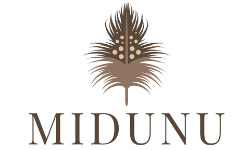
Made with Ghanaian cocoa, Midunu Chocolates are artisanal handcrafted truffles and bites featuring the African culinary heritage. The Chef Selassie Atadika finds inspiration in her travels through the various corners of Africa to subtly infuse her chocolates with spice and fruit blends. Her high-end creations are mainly aimed at the middle class, expatriates and tourists.
https://www.midunuchocolates.com/
Ghanaian chocolates certainly has a bright future! We can only encourage you to try one of these chocolates, made in Ghana… and to think about bringing some boxes as gifts when returning to your home country!

